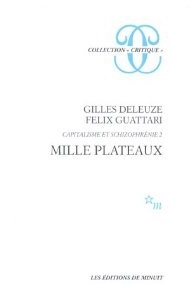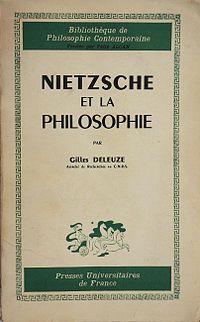Related Research Articles

Pierre-Félix Guattari was a French psychoanalyst, political philosopher, semiotician, social activist, and screenwriter. He co-founded schizoanalysis with Gilles Deleuze, and ecosophy with Arne Næss, and is best known for his literary and philosophical collaborations with Deleuze, most notably Anti-Oedipus (1972) and A Thousand Plateaus (1980), the two volumes of their theoretical work Capitalism and Schizophrenia.

Gilles Louis René Deleuze was a French philosopher who, from the early 1950s until his death in 1995, wrote on philosophy, literature, film, and fine art. His most popular works were the two volumes of Capitalism and Schizophrenia: Anti-Oedipus (1972) and A Thousand Plateaus (1980), both co-written with psychoanalyst Félix Guattari. His metaphysical treatise Difference and Repetition (1968) is considered by many scholars to be his magnum opus.
Post-structuralism is a philosophical movement that questions the objectivity or stability of the various interpretive structures that are posited by structuralism and considers them to be constituted by broader systems of power. Although post-structuralists all present different critiques of structuralism, common themes among them include the rejection of the self-sufficiency of structuralism, as well as an interrogation of the binary oppositions that constitute its structures. Accordingly, post-structuralism discards the idea of interpreting media within pre-established, socially constructed structures.
Schizoanalysis is a set of theories and techniques developed by philosopher Gilles Deleuze and psychoanalyst Félix Guattari, first expounded in their book Anti-Oedipus (1972) and continued in their follow-up work, A Thousand Plateaus (1980).

Gabriel Tarde was a French sociologist, criminologist and social psychologist who conceived sociology as based on small psychological interactions among individuals, the fundamental forces being imitation and innovation.

Hans-Jürgen Syberberg is a German film director, whose best known film is his lengthy feature Hitler: A Film from Germany.

A Thousand Plateaus: Capitalism and Schizophrenia is a 1980 book by the French philosopher Gilles Deleuze and the French psychoanalyst Félix Guattari. It is the second and final volume of their collaborative work Capitalism and Schizophrenia. While the first volume, Anti-Oedipus (1972), was a critique of contemporary uses of psychoanalysis and Marxism, A Thousand Plateaus was developed as an experimental work of philosophy covering a far wider range of topics, serving as a "positive exercise" in what Deleuze and Guattari refer to as rhizomatic thought.

Alexander R. Galloway is an author and professor in the Department of Media, Culture, and Communication at New York University. He has a bachelor's degree in Modern Culture and Media from Brown University and earned a Ph.D. in literature from Duke University in 2001. Galloway is known for his writings on philosophy, media theory, contemporary art, film, and video games.
Affect is a concept, used in the philosophy of Baruch Spinoza and elaborated by Henri Bergson, Gilles Deleuze and Félix Guattari, that places emphasis on bodily or embodied experience. The word affect takes on a different meaning in psychology and other fields.
Minority is a philosophical concept developed by Gilles Deleuze and Félix Guattari in their books Kafka: Towards a Minor Literature (1975), A Thousand Plateaus (1980), and elsewhere. In these texts, they criticize the concept of "majority". For Deleuze and Guattari, "becoming-minor(itarian)" is primarily an ethical action, one of the becomings one is affected by when avoiding "becoming-fascist". They argued further that the concept of a "people", when invoked by subordinate groups or those aligned with them, always refers to a minority, whatever its numerical power might be.
A line of flight or a line of escape is a concept developed by Gilles Deleuze and Félix Guattari in their work Capitalism and Schizophrenia. It describes one out of three lines forming what Deleuze and Guattari call assemblages, and serves as a factor in an assemblage that ultimately allows it to change and adapt to said changes, which can be associated with new sociological, political and psychological factors. Translator Brian Massumi notes that in French, "Fuite covers not only the act of fleeing or eluding but also flowing, leaking, and disappearing into the distance. It has no relation to flying."

Cinema 1: The Movement Image (1983) is the first of two books on cinema by the philosopher Gilles Deleuze, the second being Cinema 2: The Time Image (1985). Together Cinema 1 and Cinema 2 have become known as the Cinema books, the two volumes both complementary and interdependent. In these books the author combines philosophy and cinema, explaining in the preface to the French edition of Cinema 1 that "[t]his study is not a history of cinema. It is a taxonomy, an attempt at the classifications of images and signs"; and that the "first volume has to content itself with […] only one part of the classification". To make this division between the movement-image and the time-image Deleuze draws upon the work of the French philosopher Henri Bergson's theory of matter (movement) and mind (time).

Nietzsche and Philosophy is a 1962 book about Friedrich Nietzsche by the philosopher Gilles Deleuze, in which the author treats Nietzsche as a systematically coherent philosopher, discussing concepts such as the will to power and the eternal return. Nietzsche and Philosophy is a celebrated and influential work. Its publication has been seen as a significant turning-point in French philosophy, which had previously given little consideration to Nietzsche as a serious philosopher.

Carmelo Pompilio Realino Antonio Bene, known as Carmelo Bene was an Italian actor, poet, film director, and screenwriter. He was an important exponent of the Italian avant-garde theatre and cinema. In 1968, his movie Our Lady of the Turks won the Special Jury Prize at the Venice Film Festival. He died of a heart ailment in 2002.
Virtuality is a concept with a long history in philosophy, its most notable recent version being that developed by French thinker Gilles Deleuze.

Luis de Miranda is a philosopher and novelist. His earlier books, written in French, have been translated into English, Chinese, Swedish, among other languages. A PhD from the University of Edinburgh, he previously graduated in philosophy at Pantheon-Sorbonne University and in economics at HEC Paris. Since 2018, Luis de Miranda is a philosophical practitioner and member of the Swedish Society for Philosophical Practice, and an academic researcher in Sweden.
Hugh Richard Edward Tomlinson KC is a barrister in England and Wales, an English translator of the philosopher Gilles Deleuze and a founding member of Matrix Chambers. He is a specialist in media and information law including defamation, confidence, privacy and data protection.

Dialogues is a 1977 book in which Gilles Deleuze examines his philosophical pluralism in a series of discussions with Claire Parnet. It is widely read as an accessible and personable introduction to Deleuze's philosophy along with Negotiations. The book contains an exposition of Deleuze's concepts and methodologies in which he thinks of newer ways to liberate life.
Claire Parnet is a French journalist.

Cinema 2: The Time-Image (1985) is the second volume of Gilles Deleuze's work on cinema, the first being Cinema 1: The Movement-Image (1983). Cinema 1 and Cinema 2 have become to be known as the Cinema books, and are complementary and interdependent texts.
References
- ↑ Deleuze, Gilles (1984). Kant's Critical Philosophy: The Doctrine of the Faculties. Translated by Tomlinson, Hugh; Habberjam, Barbara (4th printing ed.). Minneapolis: University of Minnesota Press. ISBN 0-8166-1436-9.
- ↑ Deleuze, Gilles (1986). Cinema 1: The Movement-Image . Translated by Tomlinson, Hugh; Habberjam, Barbara. University of Minnesota. ISBN 978-0-8166-1400-4.
- ↑ Deleuze, Gilles (1988). Bergsonism. Translated by Tomlinson, Hugh; Habberjam, Barbara. Zone Books. ISBN 978-0-942299-07-6.
- ↑ Deleuze, Gilles; Parnet, Claire (1989). Dialogues. Translated by Tomlinson, Hugh; Habberjam, Barbara. Columbia University Press. ISBN 978-0-231-06601-3.
- ↑ Deleuze, Gilles; Parnet, Claire (2007). Dialogues II. Translated by Tomlinson, Hugh; Habberjam, Barbara. Columbia University Press. ISBN 978-0-231-14135-2.
- ↑ Profile, Chartered Institute of Linguists